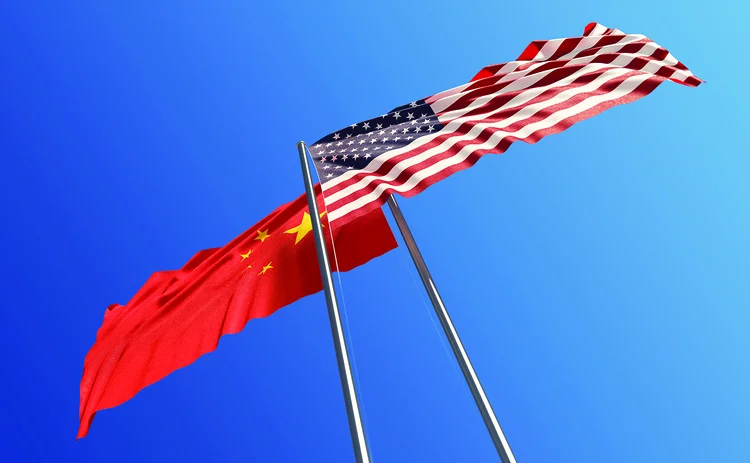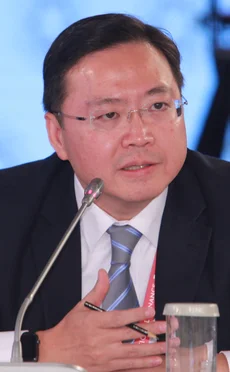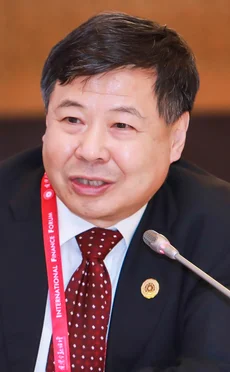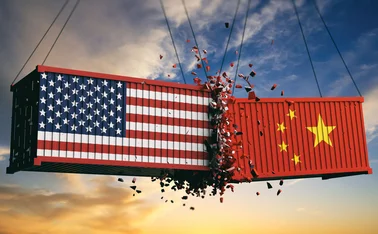
IFF Dialogue – The future of China–US relations


Rick Niu: What will happen in the final two months of President Donald Trump’s so-called ‘lame duck’ presidency for US–China relations? And what will happen in the first two years of the new administration, between inauguration and the US midterm elections?
Craig Allen: The next two months are going to be very interesting. The first priority in the US today is fighting the Covid‑19 pandemic. Covid-19 is an enormous political and economic problem – and is by no means under control. So everything I say is coloured by that very important global battle that affects US citizens directly.
Politically, the US recently completed a very good election, peaceful in the middle of the pandemic, with participation by as many as 159 million Americans. When Joe Biden is inaugurated, we will begin a new chapter.
Between now and then, I expect a lot of ups and downs. Just yesterday, the US State Department and Taiwan, China, completed a series of economic negotiations. New announcements were made about the US working with its allies in the South China Sea to tackle illegal fishing. And there were also some announcements on executive orders controlling investments by US citizens in various Chinese entities. I expect a considerable amount of continued policy initiatives and volatility over the next two months.
There will probably be a period of quiet introspection, as the Biden administrtion carries out policy reviews. I am hopeful that – perhaps in the late spring or early summer of 2021 – we can begin a process of consolidating the very turbulent US–China relationship, looking at all elements: strategic, political and economic. But it’s going to take a while, and it’s going to take both governments making efforts to exert political will to bring about this relationship and build a more secure foundation. But I do expect that to happen. So I am pessimistic in the short term, looking for consolidation in the medium term, and building on optimism in the long term.
Craig Allen is president of the US–China Business Council based in Washington, DC. His career has spanned 36 years in international trade, commerce and economic relations. Under Allen’s leadership since 2018, the US–China Business Council has grown to more than 220 members – US companies doing business in and with China. He is an advocate of a constructive business relationship between the world’s two largest economies.
Zhu Guangyao was the vice-minister of China’s Ministry of Finance between 2010 and 2018, and is a senior adviser to the State Council of the People’s Republic of China. During his time as vice-minister, he led numerous negotiations on behalf of China with the US and other partners worldwide.
Rick Niu: What is China’s perspective? How wilChina respond over the next two months? And how will China respond, or even proactively reach out, over the next two years?
Zhu Guangyao: The next two months will be a transition period in the US. Our core interest is sovereignty, security and fundamental development interest. We must do everything to protect our core interest, which is what the Chinese people demand.
We understand that, as the two largest economies in the world, China and the US should work in a professional manner to build a real bridge connecting both countries through communication based on mutual respect. With our efforts, we want a win-win situation. The next two months will be very challenging, but we are really confident.
The US and China have a common interest in global peace and development. We should do everything we can to increase the common ground between our two nations, which can only be achieved through communication. Over time, trust will be restored.
The last several months have been a disaster for our two peoples and our two countries. Trust has been eroded completely, which has been very difficult for the world as a whole. The rest of the world watches for signs of instability in the relationship between our two countries, so it is imperative we get it back on track.
I have full confidence in people such as Craig Allen and the very professional team in US, which has shown a willingness to co-operate with China. President Xi Jinping has emphasised many, many times that co-operation is the only real option.
China strongly believes our two nations have the intelligence to maintain and enhance our relationship – not only in the interest of our two countries, but in the interest of global peace and development.

Rick Niu: Considering what has happened during the Trump administration, are you hopeful there will be decent communication channels in the next two months between the two nations?
Craig Allen: I think that, over the past four years, relations have changed quite significantly. President-Elect Biden faces a very different situation from the one Donald Trump inherited. The geopolitical constraints on the relationship are very real. The contrasting positions and tensions between the US and China are not something we can ignore. They exist – and they will have to be dealt with.
Another change is in the US Congress, which is speaking often and very vocally about US–China relations. I am watching no less than 477 draft laws that would concern US businesses in China. These laws constrain the president, and will make it more difficult for a really robust dialogue to continue.
I think it is a mistake to suggest we are going back to the Obama era or, before that, the Bush or Clinton eras, with very frequent dialogue. But I am not pessimistic. The new team coming in is very pragmatic, practical and objective. They are not ideological, nor do they wish to change China. But they recognise in a very clear-eyed manner that both countries need to compete fairly across many different dimensions of international relations. The competitive nature of this relationship is going to be quite obvious.
I think this does leave room for collaboration – particularly in areas concerning the global commons. Climate change would probably be the most important of those future collaborative efforts. I hope we will work together on Covid-19 and future epidemics that may arise.
I am also hopeful that discussions and consultations on multinational or international organisations will really step up. The World Health Organization (WHO) and the World Trade Organization (WTO) are good examples. But I don’t think we are going to have consultation for consultation’s sake. There will be a clear realisation that this is competitive, and we are happy to compete with our Chinese friends in a careful, controlled and respectful manner. And that is a different tone from what was seen in the Obama administration, but something I think will bring us more stability, more civility and a better environment for business in
both countries.
Zhu Guangyao: I fully agree that many of the fundamental issues require co-ordination between China and the US. This would include issues such as climate change, antiterrorism, nuclear non-proliferation and the digital economy.
However, our immediate concern should be to control the spread of Covid‑19. China has said it is willing to co-operate internationally on this, but the withdrawal of the US from the WHO sent different signals. I look forward to the day the US rejoins the WHO.
There is also an urgent need to return to normal communication. Drawing on my personal experience, during the Obama administration, China and the US already had the China–US Strategic Economic Dialogue, which was well-established and formed under the Bush administration. The Obama administration respected the arrangement in place. But a timely information exchange is important and there is a need for future co-operation fit for the new environment.
Rick Niu: To delve into a specific economic issue – the phase one trade agreement between the US and China. I think many worldwide view this as a rare bright spot between the two administrations during the past four years. What is going to happen following the transition of power in the US? Are we going to expand the agreement into phase two and beyond?

Craig Allen: Within the transition team, the Democratic party and the Biden camp, this issue has not been fully resolved. There are policy reviews under way right now. Let me note just a couple of things. Within the bilateral relationship, I agree we have had unprecedented tension, and thus the phase one agreement provides a floor – a stable base upon which we can build trust and confidence. But it is also more than that.
In the US agricultural economy and rural areas, commodity prices are good. And that is, in large part, due to the phase one agreement. In addition, the agreement has led to real market opening in financial services, intellectual property (IP) rights, tech industries and agriculture. And, in that sense, I think it has been useful for China’s reform and opening-up agenda, as well as important for US companies. It is a win-win situation.
The agreement is for two years, up to the end of 2021. I would suggest we keep the agreement and both governments continue to implement it fully. By the end of the agreement’s term, we will need some form of a new framework or agreement. I think that timing is about right to put in a new framework and get rid of the tariffs.
We must not accept that additional tariffs blocking trade between our two countries is a positive thing. It is not, nor is it acceptable. We need to get rid of the tariffs, but we need to do that in conjunction with market-opening reform in China that leads to greater market access for foreign companies on a level playing field. It’s a difficult negotiating agenda. But it can be done, and I expect it will be done.
Rick Niu: What is going to happen with the phase one trade agreement a year from now?

Zhu Guangyao: The phase one deal will be a stable base for building trust. This year, China and the US worked very hard to implement the agreement, despite the fallout of the pandemic.
I also hope the tariffs between our two countries can be removed quickly; they impact both US and Chinese consumers. At present, any additional tariffs are not in line with WTO rules or multilateral agreements. Simultaneously, we must prepare for how China and the US will work within the new WTO environment.
Rick Niu: What do you think about the new Regional Comprehensive Economic Partnership (RCEP) in the Asia‑Pacific region – what will its role be going forward? In the context of a US-centred international trade system – and perhaps an emerging China-centred, China-influenced international trade regime – would that be essentially a model for other regional economies, eventually replacing the WTO? Or could that actually be a precursor to countries such as the US and China considering joining the Comprehensive and Progressive Agreement for Trans-Pacific Partnership (CPTPP)? What is the implication of RCEP on the US?
Craig Allen: It is a profoundly important question about the economic architecture of not only the region but the entire world.
There are many critics of RCEP, but I think they are wrong. I see this as a profound structural adjustment, the impact of which we will not fully see for 20 years. But, during that time, there will be a closer knitting together of Asia‑Pacific as a region.
I regret that the US pulled out of the original Trans-Pacific Partnership (TPP). I spent a good part of my life working on that agreement. It is quite painful that we pulled out. At the close of the Third Session of the National People’s Congress of the Communist Party of China in May 2020, Chinese premier Li Keqiang said that China had interest in the TPP and could maybe join over time by saying: “China has a positive and open attitude toward joining the CPTPP.” That would be a good thing for the region, for China and for the world. I think the Biden administration will take another look at it as well.
If the US was to join CPTPP, it would be a two- or three-year project. It would be very difficult politically too.
I regret that the US is blocking the announcement of a new WTO director-general. But, that said, we need to be very clear-eyed about the limitations of the WTO and its inability to address the digital economy, genomic medicine, biotechnology, internet, media and data. Those are issues we did not have when the WTO was established 25 years ago. It also really helps inform Chinese domestic debates about state-owned enterprises, subsidies, the role of the state and the party in the economy, and technology policy.
I would also ask: how does China’s ‘dual circulation’ agenda interact with WTO principles? Is it fully in accord with China’s commitments under the WTO? I would like to understand that better, because I think there is some tension that should be resolved by the Chinese government. China needs to implement its commitments under the WTO.
We are in a very dynamic negotiating space here – a transitional moment. We need to think very carefully about where we wish to go next. What will be sustainable for the next 10 or 15 years? How do we build a house on that foundation in which both nations can live comfortably, peacefully and prosperously? It is a difficult question, but one we need to address now.
Rick Niu: Zhu, you have been one of China’s leading architects and faces for all three of those multilateral organisations (RCEP, WTO and the predecessor to CPTPP).
Zhu Guangyao: RCEP was initiated by the 10 countries of the Association of Southeast Asian Nations (ASEAN). In 2012, ASEAN members first proposed RCEP and invited China, Japan, the Republic of Korea, Australia, New Zealand and India to join the negotiation. This was named the ASEAN Plus Six group.
RCEP successfully concluded negotiations in 2020. This is a victory for free trade policy and for multilateralism. India opted out of the agreement in November 2019, but the door is open for them should they wish to rejoin at a later stage.
RCEP is high quality and covers a number of sectors: 90% of goods can traded tariff-free within the zone. This is a very important development. We really hope this agreement can contribute to regional development, increase GDP for the region and adhere to WTO rules and regulations.
In November 2020, at the Asia-Pacific Economic Cooperation summit, President Xi said China will actively consider joining the CPTPP. And I believe the Chinese team will immediately begin the policy consultation with CPTPP members.
The CPTPP includes very clear standards for each component, which is important in terms of IP protection, such as how to enhance the data flow, how to protect information and release data. That is very important. China would like to develop an innovative society, and IP protection is our fundamental interest. In this way, a high level of agreement really helps China promote its domestic reform and enhance the capacity to create an innovative society.
The dual circulation policy refers to the complementary workings of the domestic and international markets. For domestic circulation, China needs greater structural reform because, between provinces, the flow of trade and services is divided into different blocs. We need to unify China’s market, which serves 1.4 billion people. We also need to make China’s economy more globally integrated with the global economy – only then can it continue to develop.
In recent months, the trade war between China and the US escalated. We never anticipated the US taking action to keep Chinese players out of its markets as it did in the Huawei dispute. Some thought China and the US would decouple completely. But economists, academics and scientists have spoken out about the need for co-operation and communication between our two countries.
If either nation totally lost control, in a world where nuclear technology has become widespread, it could have dire repercussions. It is time for us to better understand and learn from each other. This will pave the way for the gradual restoration of trust. I understand this will not happen overnight, but we need to pursue these channels for the future of our children and grandchildren.
Rick Niu: We have heard from the US business community that there should be some concerns that a self-reliant Chinese economy could dominate the international side of the dual circulation.
Craig Allen: First, let me acknowledge what are some very important contributions of dual circulation.
A key theme of the 14th Five Year Plan (2021–25) for National Economic and Social Development and the Long-Range Objectives Through the Year 2035 is increasing domestic consumption and improving the quality of consumption in China, better leveraging the fundamental role of domestic consumption in economic development, rather than relying on net exports or fixed capital investment. China’s consumers should have all the benefits, increase their spending and become the engine of growth in the global economy.
One of the fundamental principles of the WTO is that an import must be treated the same as a domestically produced product. I wonder how that principle can be respected and advanced by dual circulation and technological self-reliance.
Zhu makes a good point about export controls and technology issues. I think we could agree the WTO should control trade in goods and services, and data as much as possible. And both governments could be a little more careful and precise about defining national security reservations. I think both governments have a tendency to expand national security, not only in telecommunications, but in semiconductors, quantum technology and biotech.
Pretty soon you go from 5% of GDP to 15% or 20% dedicated to national security concerns. Both governments have a tendency to do this and should take a look at that. And it is not only trade – investment is also impacted because we need capital and data to flow back and forth between our economies.
I am concerned about Chinese privacy and cyber security laws, and I encourage our Chinese government and friends to ensure they are WTO-compatible, and that data is allowed to move freely while protecting personal information and vital cyber security infrastructure. This is going to be a really interesting time to try to keep the market functioning effectively, and not allowing national security to determine what furniture I buy or what food I eat. Let’s define it as narrowly and as carefully as possible. And, to a certain extent, that should be reciprocal: if it is a national security concern with China, it might be a national security concern for the US.
Zhu Guangyao: The investment issue is correct – trade is not the only issue. I also agree over the importance of data flows and cyber security. We must make the distinction between national security and protectionism, and not use national security as an excuse to implement protectionist policies.
In my view, China and the US should restore negotiations on a bilateral investment treaty. During the Obama administration, we had to work hard to promote the bilateral investment treaty, and one of the key problems that has not yet been solved is data. This issue becomes more important in a digital economy, the development of which has come under strain during the pandemic. The key element of a digital economy is data: free data flows, data privacy and data security. And international standards around data must be built and met.
With that in mind, co-ordinating China–US policy is very important. If both governments agree to restore the negotiation on the bilateral investment treaty, I believe the data issue will remain a core sticking point. However, I have confidence the digital economy will continue to develop. There are enough smart minds to overcome the data issue. I think Allen and his institution can organise US entrepreneurs to work on this very important topic, and I will try my best on China’s side.
It will be important for Chinese economic development. In the Five Year Plan, we are striving for socialist modernisation with Chinese characteristics. A digital economy with regulation and standards will be an important part of this. Before the trade war, the Chinese and US teams worked very well together. I hope we can go back to normality and continue to make progress towards a global digital economy with appropriate data controls.
Rick Niu: The US business community has had concerns over the past four years about a post-war escalation – from a trade and technology war to a currency, finance or even capital war. What is your assessment of that probability?
Craig Allen: The bilateral trade imbalance is real. Investment is the key to, if not resolving, at least addressing the problem. Historically – the US’s relationship with Europe, the UK, the Netherlands, Germany, Japan or the Republic of Korea – there is a very similar pattern. Export domination results in a very large trade deficit. And then there’s investment in the US, employing its citizens, producing goods and structurally reducing that trade deficit. That process has not really begun in China unless we count Chinese manufacturing companies privately entering the market. Unless we do this, the trade imbalance will remain, and so investment is a really important issue.
The finance industry has not been impacted as much as other sectors in terms of the bilateral diplomatic tension. As I understand, 2020 is a record year for Chinese initial public offerings on Wall Street. US companies are investing very heavily in many Chinese markets. Foreign direct investment (FDI) has slowed, but portfolio investment seems to be increasing rapidly.
As China has put on more and more stock and bond indexes, we are seeing a great deal of interest from investors out of China that have done very well. Portfolio investment is very important; FDI is more important because it is structural and long term. It is ‘forever investment’.
I want to focus on FDI. I think probably the most important result of the phase one trade agreement was a very important structural liberalisation of the Chinese financial services industry. And many US, European and Japanese companies have received approvals to compete in the Chinese market. The Chinese financial services industry, in my view, will benefit from more global players competing domestically in the Chinese market.
I am very bullish about the financial industry but also concerned about FDI and correcting that structural trade imbalance through the natural market mechanism. If the US welcomes FDI from China that uses US labour, parts and components, these firms will be able to provide jobs in some of our more economically disadvantaged areas. I want to see more of that, which means we must address the politically unsustainable trade imbalance.
I am hopeful that, over time, the two administrations will ensure the markets are going to win out over ideology, excessive concerns, and sensitivity about national security. Or, national security will advance and improve and expand through interconnectedness and accept the best ideas, the best companies, the best manufacturing processes from around the world in an open and transparent, legally binding manner.
Rick Niu: How can US financial services firms expect to be treated within the Chinese economy? Will China continue to open up this sector as aggressively as it has been?
Zhu Guangyao: It is very important that both sides listen to one another and exchange views. The US needs to listen to Chinese entrepreneurs when speaking about investment and, if the US invests in China, China will invest in the US – we have a common interest. And our businesses know they can benefit from this arrangement. so there are signs of confidence.
There are still some communication challenges that need to be resolved – especially when it comes to understanding how each company can invest in either China or the US. We understand there may still be some uncertainty from US firms about investing in China, but we are making a real commitment to make it clear and have frank, open dialogues. There is still a way to go to ensure the market adheres to international standards.
I think FDI is more important than portfolio investment. It is a long-term investment that contributes to tax revenue and employment and improves the broader market environment. Portfolio money is just one component of the financial market mechanism. It is also important to have a healthy market framework in place, and the policy to monitor it. For example, the yield on Chinese 10-year government bonds was 3.3%. Compared with the same term US Treasury bond, the surplus is 250 basis points – that is too much.
I regret to hear some still believe Chinese companies are a threat. As a leader in financial markets, I do not believe this is how US companies should think. Keeping an open market is a rule of the New York Stock Exchange. I hope the US change their thinking to further develop international financial markets.
Rick Niu: To quote the vice-chairman of the board of directors of the National Committee on US–China Relations, Maurice Greenberg: “Today we use the term ‘war’ regularly. But it’s important to remember the US and China collaborated even during military conflicts. So, while we talk about wars today, let’s also remember there is a very strong and longstanding history of friendship, brotherhood and sisterhood between our two countries.” What aspects of US–China relations will stay intact and what will change during the Biden‑Xi era?
Craig Allen: I think there will be a lot of continuity from Trump to the Biden administration. The geopolitics are complex and they are not going to change very much. There will continue to be a technological rivalry.
But the tone of the relationship will become much less confrontational and there will be efforts to collaborate on issues that affect the global commons – Covid-19 and climate change, among many others.
There will also be a more pragmatic approach between the two governments. The Biden team are very pragmatic, very practical, very realistic. They want to get things done. And they will look at China in a very pragmatic manner. This type of approach gives me hope we will find ourselves in a much more predictable and stable relationship in the months and years ahead.
I hope this proves to be the case, because China is dynamic and is moving forward, as the recent RCEP agreement shows. And President Xi’s comments about CPTPP are clear indicators of China’s future economic policy. Working together pragmatically for the next 10 years, I think, would be a really important step forward. And if the US–China Business Council could contribute to that, then nothing would give me greater pleasure.
Rick Niu: What will change from China’s perspective?
Zhu Guangyao: If I had to stress anything, it would be that there should be no confrontation, no fighting with each other and mutual respect. We need a win-win situation for both countries. This will be a positive outcome for not just us, but for the whole world.
Rick Niu: I think we all agree – Zhu, Allen and myself, and many others – that dialogue is better than no dialogue. This is also the deep belief of the International Finance Forum.
This IFF dialogue took place at the IFF Annual Conference in November 2020, ahead of the inauguration of US President Joe Biden
Only users who have a paid subscription or are part of a corporate subscription are able to print or copy content.
To access these options, along with all other subscription benefits, please contact info@centralbanking.com or view our subscription options here: http://subscriptions.centralbanking.com/subscribe
You are currently unable to print this content. Please contact info@centralbanking.com to find out more.
You are currently unable to copy this content. Please contact info@centralbanking.com to find out more.
Copyright Infopro Digital Limited. All rights reserved.
As outlined in our terms and conditions, https://www.infopro-digital.com/terms-and-conditions/subscriptions/ (point 2.4), printing is limited to a single copy.
If you would like to purchase additional rights please email info@centralbanking.com
Copyright Infopro Digital Limited. All rights reserved.
You may share this content using our article tools. As outlined in our terms and conditions, https://www.infopro-digital.com/terms-and-conditions/subscriptions/ (clause 2.4), an Authorised User may only make one copy of the materials for their own personal use. You must also comply with the restrictions in clause 2.5.
If you would like to purchase additional rights please email info@centralbanking.com







